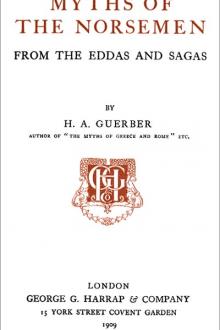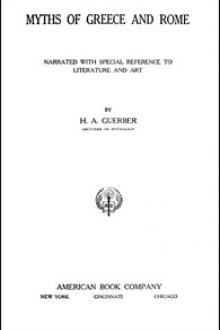Myths of the Norsemen, H. A. Guerber [ereader manga TXT] 📗

- Author: H. A. Guerber
- Performer: -
Book online «Myths of the Norsemen, H. A. Guerber [ereader manga TXT] 📗». Author H. A. Guerber
As god of peace and prosperity, Frey is supposed to have reappeared upon earth many times, and to have ruled the Swedes under the name of Ingvi-Frey, whence his descendants were called Inglings. He also governed the Danes under the name of Fridleef. In Denmark he is said to have married the beautiful maiden Freygerda, whom he had rescued from a dragon. By her he had a son named Frodi, who, in due time, succeeded him as king.
Frodi ruled Denmark in the days when there was “peace throughout the world,” that is to say, just at the time when Christ was born in Bethlehem of Judea; and because all his subjects lived in amity, he was generally known as Peace Frodi.
It is related that Frodi once received from Hengi-kiaptr a pair of magic millstones, called Grotti, which were so ponderous that none of his servants nor even his strongest warriors could turn them. The king was aware that the mill was enchanted and would grind anything he wished, so he was very anxious indeed to set it to work, and, during a visit to Sweden, he saw and purchased as slaves the two giantesses Menia and Fenia, whose powerful muscles and frames had attracted his attention.
On his return home, Peace Frodi led his new servants to the mill, and bade them turn the grindstones and grind out gold, peace, and prosperity, and they immediately fulfilled his wishes. Cheerfully the women worked on, hour after hour, until the king’s coffers were overflowing with gold, and prosperity and peace were rife throughout his land.
“Let us grind riches to Frothi!
Let us grind him, happy
In plenty of substance,
On our gladdening Quern.”
Grotta-Savngr (Longfellow’s tr.).
But when Menia and Fenia would fain have rested awhile, the king, whose greed had been excited, bade them work on. In spite of their entreaties he forced them to labour hour after hour, allowing them only as much time to rest as was required for the singing of a verse in a song, until exasperated by his cruelty, the giantesses resolved at length to have revenge. One night while Frodi slept they changed their song, and, instead of prosperity and peace, they grimly began to grind an armed host, whereby they induced the Viking Mysinger to land with a large body of troops. While the spell was working the Danes continued in slumber, and thus they were completely surprised by the Viking host, who slew them all.
“An army must come
Hither forthwith,
And burn the town
For the prince.”
Grotta Savngr (Longfellow’s tr.).
Mysinger took the magic millstones Grotti and the two slaves and put them on board his vessel, bidding the women grind salt, which was a very valuable staple of commerce at that time. The women obeyed, and their millstones went round, grinding salt in abundance; but the Viking, as cruel as Frodi, would give the poor women no rest, wherefore a heavy punishment overtook him and his followers. Such an immense quantity of salt was ground by the magic millstones that in the end its weight sunk the ship and all on board.
The ponderous stones sank into the sea in the Pentland Firth, or off the north-western coast of Norway, making a deep round hole, and the waters, rushing into the vortex and gurgling in the holes in the centre of the stones, produced the great whirlpool which is known as the Maelstrom. As for the salt it soon melted; but such was the immense quantity ground by the giantesses that it permeated all the waters of the sea, which have ever since been very salt.
Freya, the fair Northern goddess of beauty and love, was the sister of Frey and the daughter of Niörd and Nerthus, or Skadi. She was the most beautiful and best beloved of all the goddesses, and while in Germany she was identified with Frigga, in Norway, Sweden, Denmark, and Iceland she was considered a separate divinity. Freya, having been born in Vana-heim, was also known as Vanadis, the goddess of the Vanas, or as Vanabride.
When she reached Asgard, the gods were so charmed by her beauty and grace that they bestowed upon her the realm of Folkvang and the great hall Sessrymnir (the roomy-seated), where they assured her she could easily accommodate all her guests.
“Folkvang ’tis called,
Where Freyja has right
To dispose of the hall-seats.
Every day of the slain
She chooses the half,
And leaves half to Odin.”
Norse Mythology (R. B. Anderson).
Although goddess of love, Freya was not soft and pleasure-loving only, for the ancient Northern races believed that she had very martial tastes, and that as Valfreya she often led the Valkyrs down to the battlefields, choosing and claiming one half the heroes slain. She was therefore often represented with corselet and helmet, shield and spear, the lower part of her body only being clad in the usual flowing feminine garb.
Freya transported the chosen slain to Folkvang, where they were duly entertained. There also she welcomed all pure maidens and faithful wives, that they might enjoy the company of their lovers and husbands after death. The joys of her abode were so enticing to the heroic Northern women that they often rushed into battle when their loved ones were slain, hoping to meet with the same fate; or they fell upon their swords, or were voluntarily burned on the same funeral pyre as the remains of their beloved.
Freya
N. J. O. Blommér
As Freya was believed to lend a favourable ear to lovers’ prayers, she was often invoked by them, and it was customary to compose in her honour love-songs, which were sung on all festive occasions, her very name in Germany being used as the verb “to woo.”
Freya, the golden-haired and blue-eyed goddess, was also, at times, considered as a personification of the earth. As such she married Odur, a symbol of the summer sun, whom she dearly loved, and by whom she had two daughters, Hnoss and Gersemi. These maidens were so beautiful that all things lovely and precious were called by their names.
While Odur lingered contentedly at her side, Freya was smiling and perfectly happy; but, alas! the god was a rover at heart, and, wearying of his wife’s company, he suddenly left home and wandered far out into the wide world. Freya, sad and forsaken, wept abundantly, and her tears fell upon the hard rocks, which softened at their contact. We are told even that they trickled down to the very centre of the stones, where they were transformed to gold. Some tears fell into the sea and were changed into translucent amber.
Weary of her widowed condition, and longing to clasp her beloved in her arms once more, Freya finally started out in search of him, passing through many lands, where she became known by different names, such as Mardel, Horn, Gefn, Syr, Skialf, and Thrung, inquiring of all she met whether her husband had passed that way, and shedding everywhere so many tears that gold is to be found in all parts of the earth.
“And Freya next came nigh, with golden tears;
The loveliest Goddess she in Heaven, by all
Most honour’d after Frea, Odin’s wife.
Her long ago the wandering Oder took
To mate, but left her to roam distant lands;
Since then she seeks him, and weeps tears of gold.
Names hath she many; Vanadis on earth
They call her, Freya is her name in Heaven.”
Balder Dead (Matthew Arnold).
Far away in the sunny South, under the flowering myrtle-trees, Freya found Odur at last, and her love being restored to her, she was happy and smiling once again, and as radiant as a bride. It is perhaps because Freya found her husband beneath the flowering myrtle, that Northern brides, to this day, wear myrtle in preference to the conventional orange wreath of other climes.
Hand in hand, Odur and Freya now gently wended their way home once more, and in the light of their happiness the grass grew green, the flowers bloomed, and the birds sang, for all Nature sympathised as heartily with Freya’s joy as it had mourned with her when she was in sorrow.
“Out of the morning land,
Over the snowdrifts,
Beautiful Freya came
Tripping to Scoring.
White were the moorlands,
And frozen before her;
Green were the moorlands,
And blooming behind her.
Out of her gold locks
Shaking the spring flowers,
Out of her garments
Shaking the south wind,
Around in the birches
Awaking the throstles,
And making chaste housewives all
Long for their heroes home,
Loving and love-giving,
Came she to Scoring.”
The Longbeards’ Saga (Charles Kingsley).
The prettiest plants and flowers in the North were called Freya’s hair or Freya’s eye dew, while the butterfly was called Freya’s hen. This goddess was also supposed to have a special affection for the fairies, whom she loved to watch dancing in the moonbeams, and for whom she reserved her daintiest flowers and sweetest honey. Odur, Freya’s husband, besides being considered a personification of the sun, was also regarded as an emblem of passion, or of the intoxicating pleasures of love; so the ancients declared that it was no wonder his wife could not be happy without him.
Being goddess of beauty, Freya, naturally, was very fond of the toilet, of glittering adornments, and of precious jewels. One day, while she was in Svart-alfa-heim, the underground kingdom, she saw four dwarfs fashioning the most wonderful necklace she had ever seen. Almost beside herself with longing to possess this treasure, which was called Brisinga-men, and was an emblem of the stars, or of the fruitfulness of the earth, Freya implored the dwarfs to give it to her; but they obstinately refused to do so unless she would promise to grant them her favour. Having secured the necklace at this price, Freya hastened to put it on, and its beauty so enhanced her charms that she wore it night and day, and only occasionally could be persuaded to lend it to the other divinities. Thor, however, wore this necklace when he personated Freya in Jötun-heim, and Loki coveted and would have stolen it, had it not been for the watchfulness of Heimdall.
Freya was also the proud possessor of a falcon garb, or falcon plumes, which enabled the wearer to flit through the air as a bird; and this garment was so invaluable that it was twice borrowed by Loki, and was used by Freya herself when she went in search of the missing Odur.
“Freya one day
Falcon wings took, and through space hied away;
Northward and southward she sought her
Dearly-loved Odur.”
Frithiof Saga, Tegnér (Stephens’s tr.).
As Freya was also considered the goddess of fruitfulness, she was sometimes represented as riding about with her brother Frey in the chariot drawn by the golden-bristled boar, scattering, with lavish hands, fruits and flowers to gladden the hearts of mankind. She had a chariot of her own, however, in which she generally travelled. This was drawn by cats, her favourite animals, the emblems of caressing fondness and sensuality, or the personifications of fecundity.
“Then came dark-bearded Niörd, and after him
Freyia, thin robed, about her ankles slim
The gray cats playing.”
Lovers of Gudrun (William Morris).
Frey and Freya were held in such high honour throughout the North that their names, in modified forms, are still used for “master”





Comments (0)